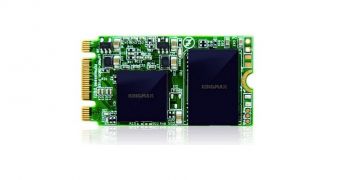The M.2 solid state drive form factor is at once one of the most amazing and one of the most frustrating types of solid state drives on the market. We are sad to say that Kingmax has done nothing to help the perception swing in the direction of the former.
You see, M.2 SSDs and associated motherboard ports can be wired in two ways: through the SATA III interface or through the PCI Express root complex.
When it's done via the former, their performance is no greater than that of all other SATA III solid state storage devices, be they 3.5-inch or 2.5-inch models: 550 MB/s or so is the top data throughput, though some rare drives go a bit above.
However, when they use the PCI Express interface, the wider bandwidth allows them to reach far beyond that mark, to 1.8 GB/s on a good day. Unfortunately, other than the ADATA M.2 SSD, there aren't many examples of such storage units. And there aren't many motherboards with M.2 ports wired through PCIe technology either, for that matter.
Alas, Kingmax played it safe (and affordable, to an extent, though this is just speculation) when it made its new M.2 solid state drives, once again using the SATA technology.
Thus, the read speed is of up to 540 MB/s, while the writing speed doesn't go above 300 MB/s, which is a bit of a shame, but also understandable, since capacity (number of NAND chips) has bearing on this performance parameter.
And Kingmax' new devices don't reach so high, not when they are so much more compact than the 2.5-inch SSDs. Which brings us to the major advantage: size.
There are two form factors: 42 (2242), which are 55% smaller than 2.5-inch drives, and 80 (2280), which are only 15% smaller because they are longer. The former come in 32 GB, 64 GB and 128 GB, while the latter can manage 256 GB as well.
All of the drives possess BCH and ECC error checking and correction technologies, plus self-monitoring, analysis and report technology (S.M.A.R.T.).
Finally, the newcomer comply with CE, FCC, BSMI and RoHS certifications for environmental protection and reliability, among others.
Unfortunately, Kingmax did not specify prices in its announcement, and you are unlikely to find them anywhere, since these SSDs will not be put up for sale via retail (probably). Instead, they will show up as selectable components in OEM laptops, and it will be weeks before contracts to that effect come into play.

 14 DAY TRIAL //
14 DAY TRIAL //